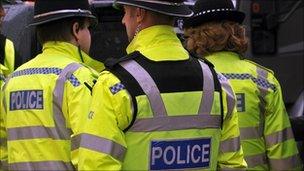Lib Dem peers intend to delay police commissioner plans
- Published

The concept of locally elected commissioners has proved controversial
Liberal Democrat peers intend to delay plans to introduce locally elected police commissioners across England and Wales, the BBC has learned.
They want the idea piloted before it is implemented nationwide and say they will disrupt the timetable by introducing amendments to legislation.
The first commissioners, with the power to hire and fire chief constables, are planned to be in place by May 2012.
Nick Clegg said the government was "committed" to the policy.
But the deputy prime minister said it was right that peers and others did everything they could to make sure it "worked in practice".
Concerns over powers
The party's spokeswoman on home affairs in the Lords, Lady Hamwee, wants the idea trialled in parts of the country for three years before it is implemented nationwide.
She said: "There are concerns about things like where the boundaries are between the new commissioners and chief constables and seeing something working as a pilot ought to give a better basis for assessing the way the whole thing will operate."
The first elections for the new police commissioners are due to take place next year.
Lord Bradshaw, another senior Lib Dem peer, said he too wanted the police commissioner idea piloted, with the delay possibly lasting beyond the next general election.
A former vice chairman of the Thames Valley Police Authority, he said he believed the government's plans would politicise the police.
He said: "The only people who would, as it were, stand are people probably with the backing of a political party or possibly in some cases a very dominant local newspaper, and I don't believe the public would feel any more represented than they are now."
He said he believed there was sufficient concern in the House of Lords for the government's plans to be defeated, and he was prepared to step down from his position as a spokesman if necessary.
The government's health reforms have already been put on pause after Liberal Democrats joined other opponents of the changes in expressing concerns.
'Proper scrutiny'
A senior Liberal Democrat party source said while they wanted elected officials involved in the police there was nervousness in the party about the control that would be given to one person under the commissioner plans.
But party leader Nick Clegg said: "The commitment to have elected police commissioners was in the coalition agreement, so that stands. Of course all of these ideas are subject to proper scrutiny and debate in the House of Lords.
"People quite rightly want to make sure how these polices are implemented in practice is properly tested and monitored. It is all about making sure what we are committed to doing actually works in practice."
Labour said there was "not a shred of evidence" that police commissioners were needed.
"The government's policy gives a great deal of power to one politician, responsible for whole regions and millions of people, with no real checks and balances on their actions," said shadow policing minister Vernon Coaker.
The £100m spent on the plan could be used instead on safeguarding the jobs of 600 full-time officers, he added.
Amending the plans
Several former senior police officers who have expressed concerns about the bill are due to speak when the Police Reform Bill has its second reading in the Lords next week and are expected to add their voices to those seeking changes.
Liberal Democrats who oppose the commissioners do not expect a significant rebellion at second reading. Instead they will make public their intention to amend the bill in committee.
Conventions in the upper house mean amendments made there would probably be voted on at report stage.
The coalition document commits the government to making the police accountable through the oversight of a directly elected individual.
A similar pledge was made in the Conservative manifesto. The Liberal Democrat manifesto had no plans for individual commissioners, but did promise the direct election of police authorities, which would be given more powers including the right to hire and fire chief constables.
- Published28 March 2011
- Published9 February 2011
- Published9 February 2011
- Published22 September 2010
- Published26 July 2010